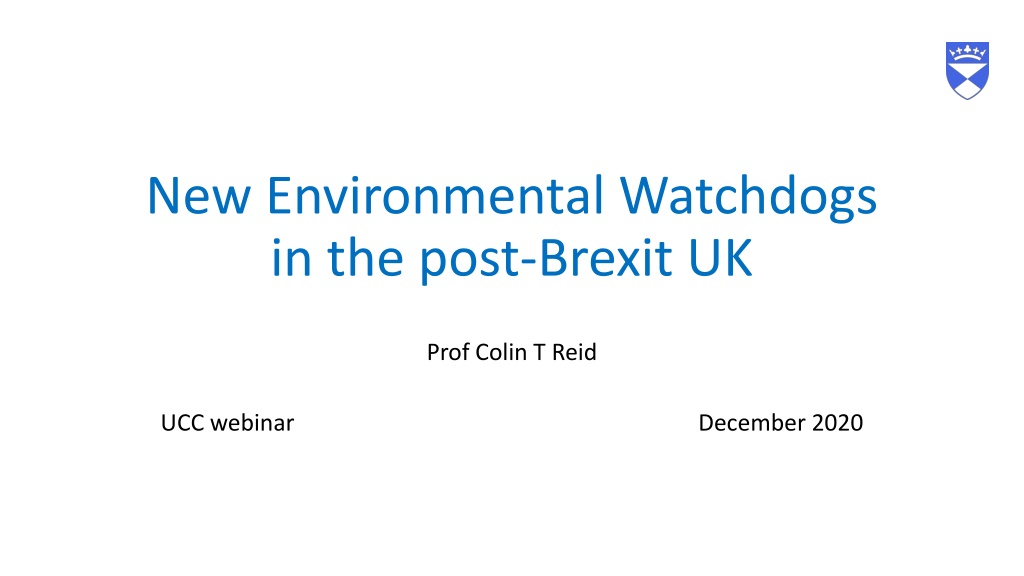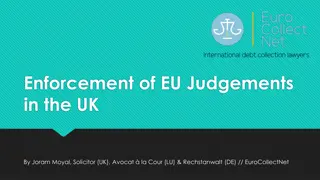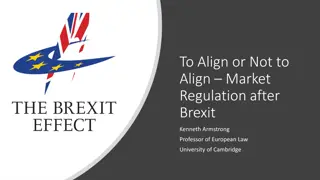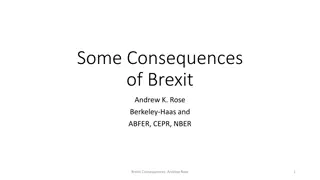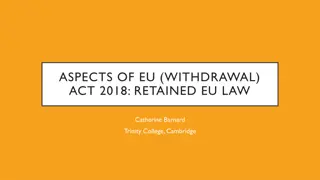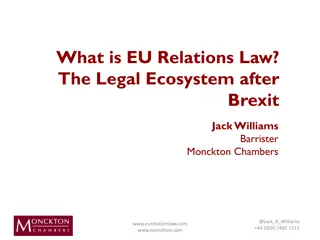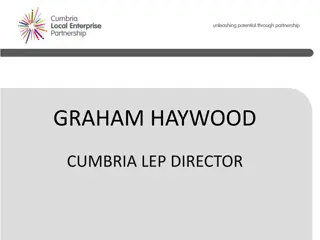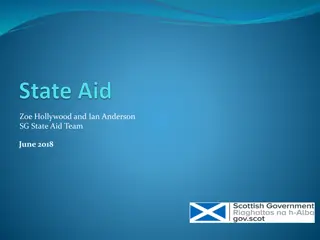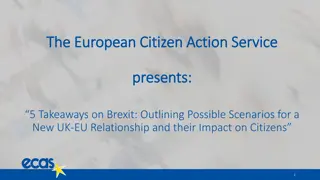Environmental Watchdogs and Post-Brexit Legal Landscape in the UK
Brexit brought significant changes to environmental law in the UK, including the rollover of existing EU legislation and the establishment of new environmental watchdogs. The post-Brexit scenario raises questions about accountability, enforcement, and future changes to retained EU laws. Different regions of the UK are implementing their own measures to monitor and enforce environmental standards. The transition period has necessitated adaptations to ensure compliance and address potential deficiencies in the legal framework.
Download Presentation

Please find below an Image/Link to download the presentation.
The content on the website is provided AS IS for your information and personal use only. It may not be sold, licensed, or shared on other websites without obtaining consent from the author. Download presentation by click this link. If you encounter any issues during the download, it is possible that the publisher has removed the file from their server.
E N D
Presentation Transcript
New Environmental Watchdogs in the post-Brexit UK Prof Colin T Reid UCC webinar December 2020
Brexit UK left EU on 31 January 2020 Currently in transition/implementation period until 31 December 2020, with little change Then - ????? Devolution dimension Environmental law a heavily devolved area But interplay with notion of UK internal market and obligations under international trade agreements
Environmental Law post-Brexit Existing EU law, and domestic law based on it, rolled-over Includes case-law of CJEU Becomes retained EU law European Union (Withdrawal) Act 2018 European Union (Withdrawal Agreement) Act 2020 Many detailed amendments to remove role of EU bodies and references to EU and its processes
Future changes to retained EU law 2018 Act gives Ministers wide power deal with any failure of EU retained law to operate efficiently or any other deficiency Also can be changed by ordinary legislation (subject to any level playing field agreement) CJEU case-law remains binding, but can be departed from Under 2018 Act could be overridden only by Supreme Court, on same basis as their own decisions Under 2020 Act, regulations being made to allow Appeal Courts to do so as well
Accountability Loss of European Commission s oversight Ultimately CJEU s power to compel compliance and impose sanctions In addition to formal processes Routine overview through reporting requirements Cost-free route for complaints Lots of cases dealt with informally UK administrative law system not accustomed to duties placed on Government to meet targets etc. Climate Change Acts If target not met, who can sue, when, with what remedy?
Plans for future watchdogs England will have Office for Environmental Protection Environment Bill Bill also has substantive measures on principles and air, water, waste, resource efficiency, biodiversity net gain and conservation covenants Northern Ireland will also be covered by OEP Environment Bill Scotland will have Environmental Standards Scotland UK Withdrawal from the European Union (Continuity) (Scotland) Bill Bill also provides for principles and wide power to keep in step with EU law Wales appointing Interim Environmental Protection Assessor Legislative measures deferred until after May 2021 elections a platform whereby possible instances of failure to implement or non- compliance with environmental law in Wales may be reported
Oversight issues Independence Impossible to match the independence of an external, powerful body as within EU Resources and capacity Role Complaints or review; advisory Non-compliance or wider issues Scope Accessibility Easy and free to complain to Commission - very different from cost of legal actions Remedies Need to be effective, whether formal or informal Links with EU and other international bodies Continuation within networks and access to data and standard-setting
England and UK matters Office for Environmental Protection Monitor progress on environmental improvement plans and targets Advice to government Monitor implementation of environmental law legislative provisions , so not international obligations Oversight of non-compliance Must act objectively and impartially, and with regard to the need to act proportionately and transparently
Office for Environmental Protection Appointed by Secretary of State SoS can issue guidance on enforcement policy and functions that OEP must have regard to Duty on SoS to pay such sums as considered reasonably sufficient to enable the OEP to carry out its functions Can look at some climate matters, but Memorandum of Understanding with Committee on Climate Change Must produce Strategy
Northern Ireland OEP will oversee devolved matters in NI as well Essentially same as for England One NI member appointed by NI Government and future chairs jointly and other members with consultation NI Government to contribute to resources No power for NI Government to issue guidance on exercise of functions Independent Environment Agency promised in New Decade, New Approach (the deal to re-establish NI Assembly and Government)
OEP - Enforcement Complaints from public of serious failure by public authority to comply with environmental law Also on own initiative Information notice where has reasonable ground to suspect breach Authority must provide information requested Decision notice Satisfied on balance of probabilities that failure to comply and it is serious Set out steps required - remedy, mitigate or prevent reoccurrence Authority must respond within 2 months Environmental review After time for response, refer to court whether original conduct in breach of law Statement of non-compliance Apply judicial review principles and remedies, but not damages Can go directly to judicial review in urgent and serious cases
Scotland Environmental Standards Scotland Function to monitor - public authorities compliance with environmental law - effectiveness of environmental law and how it is implemented and applied Includes implementation of international obligations Not to deal with particular instances the exercise of regulatory functions in relation to a particular person or case (for example, a decision on an application for a licence or a decision on regulatory enforcement in a specific case)
Environmental Standards Scotland Appointed by Scottish Ministers, with approval of Scottish Parliament Initial non-statutory appointees can be carried over Express provision that not subject to direction or control of Government Unless contrary is provided Power for Ministers to revise functions Must produce Strategy Scope does not extend to climate change targets
ESS - Enforcement Information notices Non-compliance reported to court as contempt of court Improvement reports Based on non-compliance or lack of effectiveness Made to Scottish Ministers who must publish report and respond Improvement plan must be produced Scottish Parliament can reject Compliance notice Failure to comply where continuing or may be repeated and actual or likely environmental harm Authority can appeal to sheriff court Failure to comply is referred to Court of Session, to be dealt with as if contempt of court Can seek judicial review in serious cases
The future Welcome that something being done to fill a big gap Cannot replace power of EU institutions Notable differences across the UK Much stronger enforcement powers in Scotland Concerns over extent of ministerial influence Much will depend on culture and approach Intention to allow for informal resolution without recourse to legal procedures How serious are the governments about delivering on their environmental rhetoric?
Reid: Mapping post-Brexit Environmental Law ERA Forum open access https://rdcu.be/b7nq7
